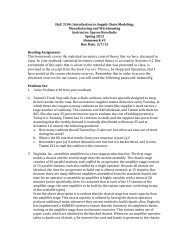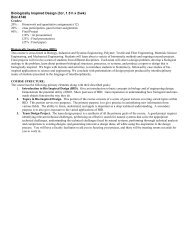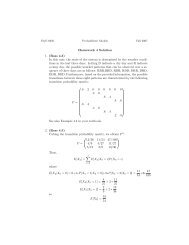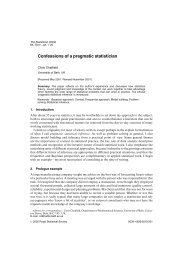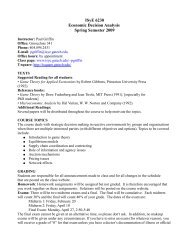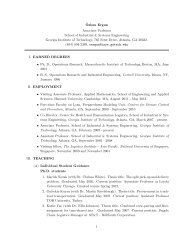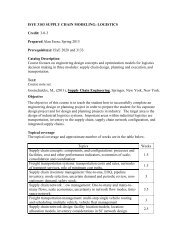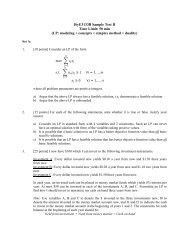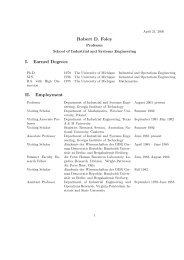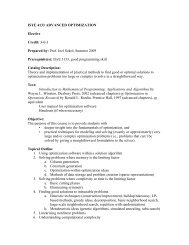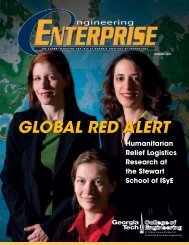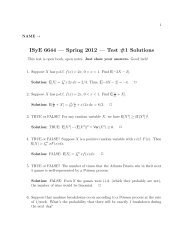Fall 2009 - H. Milton Stewart School of Industrial & Systems ...
Fall 2009 - H. Milton Stewart School of Industrial & Systems ...
Fall 2009 - H. Milton Stewart School of Industrial & Systems ...
Create successful ePaper yourself
Turn your PDF publications into a flip-book with our unique Google optimized e-Paper software.
ON THE MOVE<br />
Transportation Logistics at ISyE<br />
Effective utilization <strong>of</strong> nurses is<br />
crucial in meeting the demand<br />
for home care, which is expected<br />
to double by 2030 according the<br />
National Health Policy Forum <strong>of</strong><br />
The George Washington University.<br />
Focus on: Ashlea Bennett<br />
Vehicle Routing and Scheduling Models<br />
for Home Healthcare Nurses<br />
Ashlea Bennett, PhD candidate in the <strong>Stewart</strong><br />
<strong>School</strong>, was awarded a prestigious National<br />
Science Foundation Graduate Research<br />
Fellowship in 2003 that provided support for<br />
academic research <strong>of</strong> her choice within her doctoral studies<br />
program. Bennett, along with her faculty advisor Alan Erera,<br />
had an interest in synthesizing concepts from logistics with<br />
applications in healthcare. Drawing from Erera’s existing<br />
work in freight transportation and Bennett’s desire to make<br />
systems and processes more efficient within healthcare,<br />
they decided to pursue the topic <strong>of</strong> routing and scheduling<br />
models for home health nurses.<br />
According to Bennett, the home health nurse routing and<br />
scheduling problem is complex. For each patient, it must be<br />
determined which nurse will visit the patient, what days the<br />
patient will be visited on consecutive weeks throughout his<br />
or her prescribed episode <strong>of</strong> care, and what times the visits<br />
on those days will occur. The result culminating from each<br />
<strong>of</strong> these patient-scheduling decisions is a set <strong>of</strong> nurse routes,<br />
where each nurse leaves home at the beginning <strong>of</strong> the day<br />
driving his or her own vehicle. The nurse then visits a predetermined<br />
sequence <strong>of</strong> patients at precise visit times, and<br />
returns home at the end <strong>of</strong> the day, without working more<br />
than the maximum allowable hours. Further complicating<br />
the problem is that many patient requests for home health<br />
services must be scheduled on the same day the patient is<br />
discharged from the hospital.<br />
Bennett is designing automated scheduling mechanisms<br />
that focus on improving nurse utilization and customer<br />
service when creating nurse schedules. “Nurse utilization<br />
can be improved by leveraging advanced routing heuristics<br />
that use predictive information regarding expected future<br />
patients when creating nurse schedules,” said Bennett. “By<br />
decreasing the time that nurses spend traveling and waiting<br />
between patient visits, the nurse has more time available to<br />
visit patients. Customer service is improved by providing<br />
patient visit schedules that are repeatable from week to<br />
week.”<br />
To ensure that theoretical components <strong>of</strong> their research<br />
were grounded in providing solutions to problems<br />
encountered in the real world by actual home health<br />
agencies, Bennett and Erera partnered with Visiting<br />
Nurse|Hospice Atlanta (VN|HA), the largest nonpr<strong>of</strong>it<br />
provider <strong>of</strong> home care in the metropolitan Atlanta area. Mark<br />
Oshonock, President and CEO <strong>of</strong> VN|HA, states that “if nurse<br />
utilization could be improved by 10 percent, or one half-visit<br />
per day, we could visit an additional 1,200 patients per year<br />
without increasing the size <strong>of</strong> our workforce.”<br />
Because <strong>of</strong> the positive response from this project, VN|HA<br />
has agreed to fund Bennett’s education after her fellowship<br />
tenure expires.<br />
Bennett earned her bachelor’s in industrial engineering<br />
from the University <strong>of</strong> Arkansas in 2003. She became<br />
interested in logistics during an undergraduate internship<br />
with the Engineering Services department at the corporate<br />
headquarters <strong>of</strong> J.B. Hunt Transport, LLC, in Lowell,<br />
Arkansas. After receiving her master’s in industrial and<br />
systems engineering from Virginia Tech in 2005, she came<br />
to Georgia Tech to pursue a doctoral degree. Bennett will<br />
graduate in December <strong>2009</strong> and has accepted a faculty<br />
position with the University <strong>of</strong> Arkansas starting in<br />
January 2010.<br />
The Alumni Magazine for the <strong>Stewart</strong> <strong>School</strong> <strong>of</strong> ISyE <strong>Fall</strong> <strong>2009</strong> • 17



